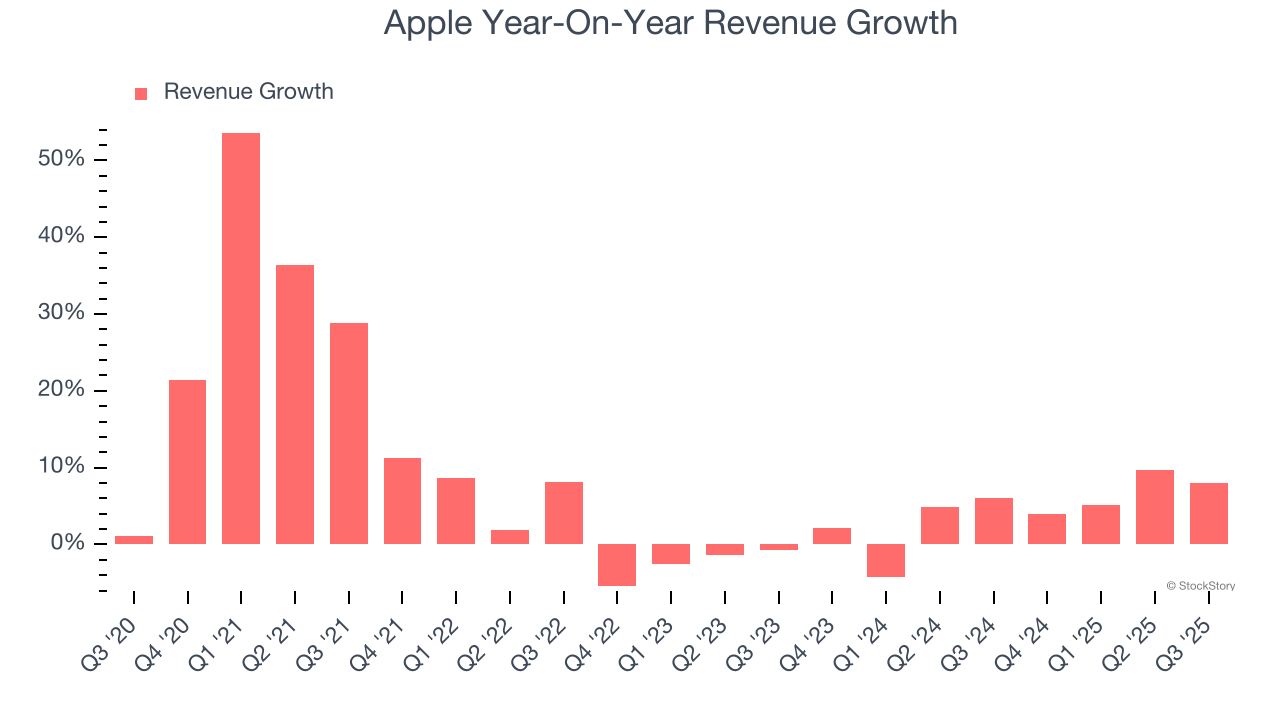“Apple won’t be in the Magnificent 7”: Fundies back Alphabet as top tech pick after Buffett’s big buy

Much of the discussion around Berkshire Hathaway’s US$4.3 billion investment into Alphabet (NASDAQ: GOOG) has focused on what Warren Buffett and his lieutenants see in Google’s future.
Far less has been said about the other side of the trade - why Apple (NASDAQ: AAPL) is quickly losing its privileged status inside Berkshire’s massive US$300 billion equity portfolio (see chart below).

Buffett has openly admitted he was late to the technology game and missed earlier opportunities to buy great businesses at bargain prices. But make no mistake: he learned quickly.
The firm’s technology bets tend to come at moments when the market is mispricing durability, dominance or optionality. And when Berkshire sells or trims, those signals often deserve just as much attention.
Using data from Stockcircle, we summarise total return estimates from Berkshire’s biggest technology bets over the past 15 years:
- Visa: Bought 2011 → Still held (518% gain)
- IBM: Bought 2011 → Exited 2017 (5% gain)
- Apple: Bought 2016 → Currently trimming (575% gain)
- Amazon: Bought 2019 → Still held (164% gain)
- Snowflake: Bought 2020 → Sold in 2024 (7% gain)
- Alphabet: Bought 2025 → Still held (too early to tell)
Even allowing for the modest outcomes on IBM and Snowflake, Berkshire’s tech strike rate is remarkably strong. The mediocre wins were more than offset by Berkshire redeploying capital into some of the most lucrative trades of Buffett’s career - most notably Apple, which now stands as Berkshire’s single most profitable investment ever, and Amazon, which has compounded steadily since 2019.
In other words: when Buffett trims a tech position or reallocates capital, it tends to be deliberate - and often prescient.
So what are Buffett and his lieutenants spotting in Alphabet - and not in Apple - that the market is only now waking up to? We asked three top tech managers.
Alphabet was priced like an AI loser - now the data is proving the opposite
Jacob Mitchell, Antipodes
Antipodes rebuilt its Alphabet position aggressively when Google collapsed to ~15× earnings earlier this year, a multiple that suggested its Search franchise was on the verge of existential disruption.
Mitchell says that narrative never matched the facts.
“It was being priced like an AI loser. People were focusing on the wrong data points," he says.
Even as ChatGPT headlines mounted, the metrics that actually matter for Alphabet held firm:
- commercial queries (the most lucrative part of Search) kept growing
- paid clicks re-accelerated
- YouTube maintained ad momentum
- Chrome and Android retained distribution dominance
At the same time, Alphabet’s AI execution has improved dramatically. The latest Gemini 3 model is outperforming GPT-5 on core intelligence benchmarks - and crucially, was trained entirely on Google's homegrown Tensor Processing Units (TPUs). And Gemini's improvements are being noticed - it is eating OpenAI's lunch.

Mitchell argues this vertical stack is beginning to show its compounding advantages:
“Google is emerging as an AI winner across the stack - the silicon layer, the cloud layer, the application layer. It all works together," he says.
In contrast, Mitchell is far more sceptical about Apple’s long-term prospects - and he believes Buffett’s selling makes perfect sense. In her view, Apple is losing its strategic momentum.
"Apple won't be in the Magnificent 7," says Mitchell.
He points to three structural problems:
- Slowing iPhone revenue growth;
- An ecosystem that is already fully monetised, leaving limited upside;
- And a valuation that prices Apple like a high-growth company despite fundamentals that look increasingly mature.
“Apple is an overvalued consumer-quality business with no real growth. The AI cycle might give them a bump, but you’re still left with a mature hardware business wearing a tech multiple," says Mitchell.
Positioning: With Alphabet shares up around 60% this year, Antipodes has taken some profits, trimming their position slightly and moving the stock to a “hold.” It remains a top-10 holding in the Antipodes Global Fund, which notably has no exposure to Apple.
The only player that controls the entire AI stack
- Cliff Man, ETF Shares
While headlines focus on Google’s antitrust battles or fears about AI disruption to Search, Cliff Man believes Berkshire may be looking at a more foundational advantage: Google’s unique level of vertical integration.
“Google is the only fully vertically integrated AI company," says Man.
Where Microsoft’s AI efforts rely heavily on OpenAI, and Amazon plugs gaps using Anthropic, Google benefits from end-to-end control:
- its own foundational models (Gemini)
- its own silicon (TPUs)
- its own cloud hyperscaler
- its own distribution (Search, YouTube, Gmail, Maps, Chrome, Android, etc.)
- 2 billion daily users inside its ecosystem
This, Man argues, matters far more than short-term fears around AI cannibalising Search.
"Vertical integration allows Google to get the cost of product down, which is very attractive given investors' loudening concerns about spiralling AI capex," he says.
Google is a key holding for the ETF Shares Magnificent 7 Plus ETF Fund (ASX: HUGE), and Man points out it currently trades at one of the lowest valuations among Big Tech.
.png)
"I personally like Google the most of the Mag 7 stocks because of the optionality it has on future tech, like AI and autonomous driving. Google has been investing in 'moonshots' for years and was one of the earliest backers of SpaceX. These moonshots offer a huge upside if they reach commercial maturity and scale and are not fully priced in my opinion," he says.
On Apple, he agrees with Mitchell that the company that invented the modern phone is slowly looking like its losing its place.
Apple is the classic 'flight to quality' trade as its aggressive buyback program under Tim Cook has put a floor on its share price. However, the market is worried that its revenue is concentrated in iPhone sales, which are vulnerable to fluctuations in consumer spending and worried that it has failed to come up with any new compelling products this decade.
Positioning: Man rates Alphabet a “buy." The stock is a core position in the ETFS Magnificent 7+ ETF (ASX: HUGE), where it sits in an equally weighted portfolio alongside nine other stocks.
Buffett bought when the probabilities swung decisively in Alphabet’s favour
- Ryan Joyce, Magellan
Magellan’s Ryan Joyce believes Berkshire stepped into Alphabet at a moment when the valuation and probability-adjusted upside were simply too attractive to ignore. At the time, Alphabet was trading on a mid-teens forward PE - the lowest of the Magnificent 7 by a wide margin, and unusually cheap both relative to the market and to its own history.
As Joyce explains:
“Buffett and his lieutenants were likely attracted to Alphabet’s undemanding valuation relative to the strong profit growth it is delivering by virtue of its dominant position in Search, strong demand backdrop and improving competitive position in hyperscale cloud, and continued viewership gains at YouTube.”
That low valuation existed only because the market was paralysed by two overhangs:
- Fears that ChatGPT would disrupt Google’s core Search business, and
- A pending US antitrust ruling that threatened Google’s default distribution agreements, “particularly with Apple.”
Berkshire effectively bet that both risks were temporary and this is exactly what played out. The September ruling removed the biggest regulatory threat and allowed Alphabet and Apple to extend their long-standing Search partnership into AI, while Alphabet’s own AI execution materially improved.
Joyce highlights that early monetisation trends are already encouraging.
"In Search, we are seeing increasing evidence that AI will expand the volume of commercial queries, AI queries are already monetising at a similar rate to traditional search with more optimisation to follow, and that Google’s AI overviews and Gemini are gaining significant user traction and closing the gap to ChatGPT," he says.
Alphabet’s Cloud business is also strengthening, supported by a US$155 billion backlog, accelerating bookings, and improving operating margins as Google’s in-house silicon strengthens its competitive position. On Google versus Apple, Joyce is far more positive on the former:
“While needing to execute well to navigate the evolution of Search, Alphabet is the leading AI company at a point in time where the economic value of what AI can deliver is expanding massively which creates significant opportunity," he says.
Apple, by contrast, is a much more mature story - and the chart below highlights this.

“Apple is a very high-quality and predictable iOS installed base business, but it is relatively mature, having already monetised its customers to a high level," says Joyce.
Positioning: Magellan continues to rate Alphabet as a "buy" and holds it as a mid-single-digit weight even after taking profits into recent strength.
Final words
Across all three fund managers, the verdict is consistent: Alphabet is positioned for the next era of tech leadership, while Apple risks becoming the kind of legacy giant it once displaced.
2 topics
2 stocks mentioned
3 contributors mentioned

